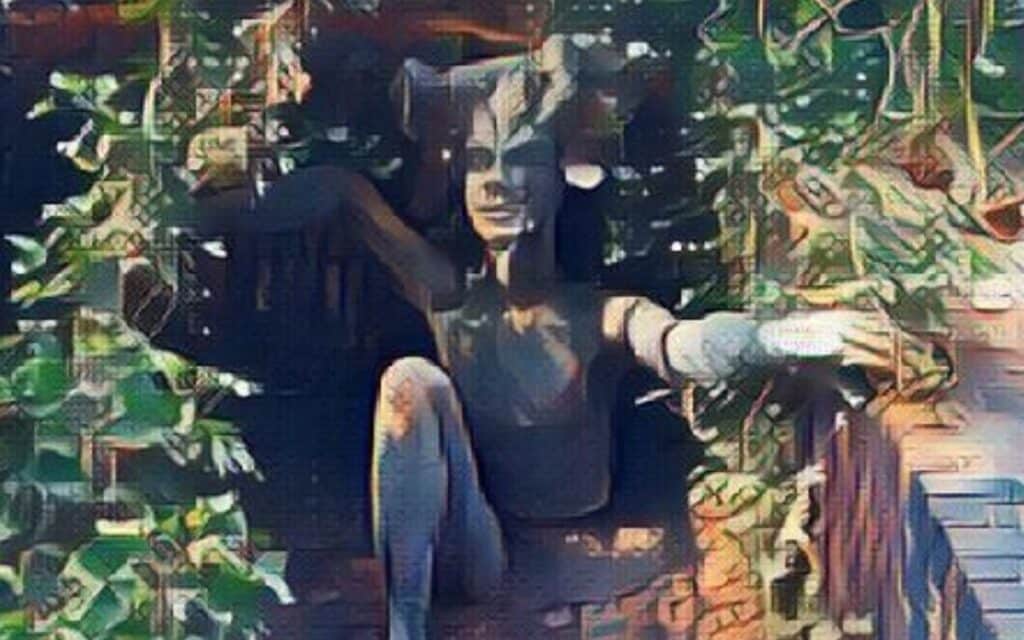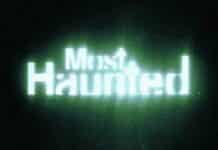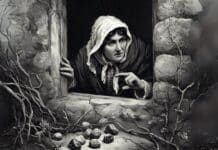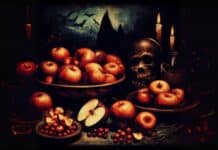Spriggans guard treasure and sacred sites and are often blamed for causing mischief and misfortune. We take a look at these mischievous Cornish supernatural beings.

The folklore surrounding spriggans is rooted in Cornish mythology and has been passed down through generations of oral tradition. In Cornish folklore, the creatures were believed to be spirits or supernatural beings that inhabited the landscape of West Penwith in Cornwall.
They were often associated with ancient ruins, cairns and barrows, where they guarded hidden treasure or acted as guardians of sacred places.
The Cornish believed that the spirits of giants, who once inhabited the area, had been transformed into the smaller and more mischievous spriggans.
What do Spriggins look like?
Spriggans were often described as grotesque and ugly creatures with large childlike heads and twisted features. They were known for their unpleasant dispositions and enjoyed causing mischief to those who offended them. They were blamed for accidents, thefts and other misfortunes that befell people and their livestock.
Despite their small stature, spriggans were said to have retained the immense strength of their giant ancestors.
In some tales, they were even able to swell to enormous size and become towering giants themselves.
Spriggans were often associated with mines and were believed to be responsible for the dangerous and unpredictable conditions that miners faced underground. However, other Cornish supernatural beings known as buccas or knockers were thought to be more benevolent and were believed to guide and protect miners.
Spriggans in Literature
From traditional Cornish folk songs and poems to modern poetry, spriggans have left an indelible mark on the literary world.
For instance, Robert Hunt’s “The Piskey-Purse” is a traditional Cornish poem that mentions spriggans and their relationship with miners. Charles Causley’s “Cornish Spriggans” and John Harris’ “The Spriggans” are two other notable poems that feature these creatures.
Spriggans have also been featured in various works of fiction, such as Neil Gaiman’s Stardust and Terry Pratchett’s The Wee Free Men. The mysterious and mischievous nature of spriggans has captured the imaginations of many writers and artists, inspiring them to create a wide range of works that continue to enchant and intrigue readers to this day.
Here are some poems about spriggans for you to enjoy:
Spriggan Country by Alan M. Kent
They say the spriggans
are spirits of the dead
guarding their treasure
from the living, the bold.
The treasures they keep
are ancient and rare:
the riches of giants
from days long gone by.
Their homes are the cairns,
the barrows, the stones,
in quiet places
by paths untrodden.
They dance in the night
by the light of the moon,
the mischievous spriggans,
their laughter so wild.
But woe betide those
who seek out their gold,
who covet their treasure,
and do not heed warning.
The spriggans will curse them,
make them pay for their greed,
and wither their crops
and bring ill-luck to their homes.
So beware, oh beware,
of the spirits of the dead,
for they guard their treasure
in the land of the spriggans.
The Spriggans by John Harris
Mischievous Spriggans, they could make or mar,
And dearly love a joke beyond a doubt,
Yet they were said to have a noble heart.
They’d work with pisky, fairy, and the rest,
And labour in the mine with patient zest,
And never asked aught but a crust and rest.
They could be kind, and oh! how gently touch
A child’s wan cheek, that never knew of such,
A joy or brightness–give the pale lips speech,
And eyes that had been dim, could love and see,
And in the pastures where the cattle be,
They’d build a daisy throne, and sing right merrily.
They’d watch the spinning-wheel, and sometimes bring
A wondrous touch to speed the whirling thing,
And as the flax was spun, or distaff wound,
They’d form in mazy ring and dance around.
Cornish Spriggans by Charles Causley
The Spriggans, one and all,
Are rather small
But none the less they are most ferocious,
And given to deeds atrocious.
Their principal delight
Is to set a spite
On a farmer’s cattle or his crops.
And often before the day breaks,
With a noise like the rattle of chains,
They drive his horses mad
Or leave his cows in pains.
Once in a hundred years,
Or so the tale appears,
The Spriggans dance upon the tor,
And when their sport is done
They sink into the earth,
And are seen no more.
The Spriggans dance a measure
That none can ever know,
Except the dead and the lost;
But when they reach the climax
They sink into the hill
And leave behind a mist.
The Piskey-Purse by Robert Hunt
The Piskey had a purse,
And well he filled it too,
With every shining thing,
That caught his roving view.
He had a silver penny,
And a golden pound beside,
And pebbles from the brook,
And flowers from the side.
He had a feather green,
And one of raven black,
And many a glittering thing,
That to his store did lack.
The Spriggans, like the Pixies,
Haunt the hill,
And with the Piskey they their coffers fill;
The farmer, ploughing on the mountain side,
May find a Piskey purse if he’ll abide.
Then let him keep it safe,
And guard it night and day,
For if the Piskey come,
And find it gone away,
He’ll conjure all the elves,
And raise the winds and rain,
And fright the farmer’s wife,
And drag her bed amain.
But if he treat it well,
And keep it with good care,
The Piskey will repay him
With treasures rich and rare.
The sun upon his fields,
Shall brighter shine and glow,
And all the earth shall bloom,
As in the spring-time’s show.
So let the farmer seek,
For Piskey-purse with care,
And he shall richer be
Than all the country there.
Tell us your thoughts on Spriggans in the comments section below!









